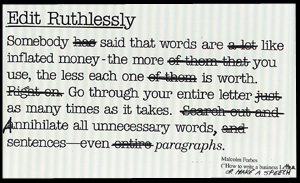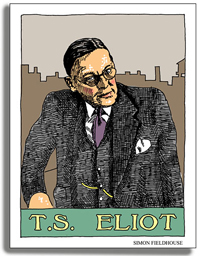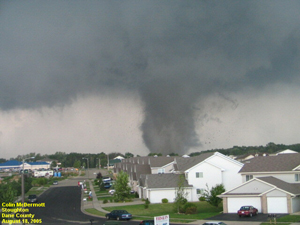
Source: Edit Ruthlessly, Dan Patterson, Flickr
Now let’s consider the second writing “app”: antithesis. Antithesis brings the power of the familiar to comparisons and distinctions. Instead of this sentence:
That bulletin board was not a decoration; it was something that got in the way of our learning.
You could use antithesis and rewrite the sentence in this way:
That bulletin board was not a decoration; it was a distraction.
The prose is tighter and more powerful partly because the sentence is shorter but mostly because “decoration” and “distraction” have a feeling of opposition. One feels clearly positive, the other clearly negative.
See if you can complete the statements below with the right missing parts.


Source: S Eliot Simon Fieldhouse, Simon Fieldhouse, Wikimedia
Using antithesis adds power to your comparisons. T.S. Eliot ended his famous poem “The Hollow Men” with an antithetical:
This is the way the world ends
Not with a bang but a whimper.
Paradoxically, the antithesis ends the poem with a bang. All the passages below need something to finish them off. Read each passage and add an antithetical comparison as a way to end the passage with a bang rather than a whimper.
Revision time
 Use your notes to complete each of the following passages with a statement that includes an antithesis. When you are finished, check your understanding to see some possible responses.
Use your notes to complete each of the following passages with a statement that includes an antithesis. When you are finished, check your understanding to see some possible responses. 
Source: ’55 Ford Fairlane (Auto classique Salaberry-De-Valleyfield ’11), Bull-Doser, Wikimedia
- My cousin Jake loves taking care of his 1955 Ford Fairlane. He often spends most of Saturday morning detailing the car. A lot of people hate taking care of their cars. They would rather be playing basketball or shopping or watching a movie. But for Jake taking care of his car is not so much . . .

Source: Stoughton Tornado, NWS/NOAA, Wikimedia
- Last year a tornado hit a small town not far from where I live. When I saw pictures of the destroyed homes in the town, I felt I had to do something. I called the number that the TV station provided for people who wanted to make donations or volunteer with the cleanup. I spent all day helping families sort through what used to be their homes. The people we helped told us how much it meant that we were helping them out. By the end of the day, I felt closer to some of those people than I do to people I’ve known for years. Sometimes when bad things happen to people, there are . . .

Source: walking on the shore, bradleygee, Flickr
- When I start writing an essay, I go for a walk. I know that sounds sort of crazy, but it really works for me. I make sure that I am very clear about the assignment before I take off and try to have some idea about what my thesis position is going to be. Then I take off for the six-mile trail around Crystal Lake. I bring a small notepad and a pencil just in case, but most of the time I don’t write anything down. It may seem strange, but for me the best way . . .
- But for Jake, taking care of his car is not so much a chore as a pleasure.
- Sometimes when bad things happen, you can become close to people you don't know.
- It may seem strange, but for me the best way to get started on my writing is to take a break.
Both analogy and antithesis are power enhancements; they improve the impact of your writing. As with any power enhancement, these devices must be used sparingly as well as correctly. As we noted in the section on analogies, a bad analogy is not going to make your writing stronger. The same can be said about using antithesis. In fact, using these techniques incorrectly is going to cause confusion; therefore, it can be said that using analogy and antithesis might weaken your writing.